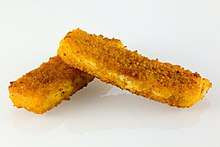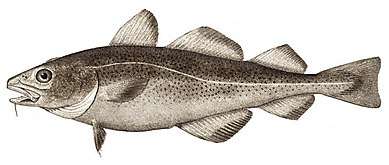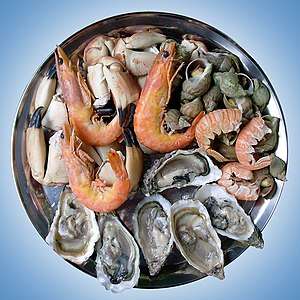Fish finger
Fish fingers (British English) or fish sticks (American English) are a processed food made using a whitefish, such as cod, hake, haddock or pollock, which has been battered or breaded. They are commonly available in the frozen food section of supermarkets. They can be baked in the oven, grilled, shallow fried, or deep-fried.
 Fried fish fingers | |
| Alternative names | fish sticks |
|---|---|
| Place of origin | United Kingdom |
| Main ingredients | whitefish, battered or breaded |

History
The term "fish finger" is first referenced in a recipe given in a popular British magazine in 1900,[1] and the dish is often considered symbolic of the United Kingdom.[2]
The food restrictions during and after WWII expanded the consumption of fish fingers, but companies struggled to maintain decent quality.[3][4] The commercialization of fish fingers may be traced to 1953 when the American company Gorton-Pew Fisheries, now known as Gorton's, was the first company to introduce a frozen ready-to-cook fish finger; the product, named Gorton's Fish Sticks, won the Parents magazine Seal of Approval in 1956.[5][6]
There was an abundance of herring in the United Kingdom after World War II. Clarence Birdseye test-marketed herring fish fingers, a product he had discovered in the United States,[7][8] under the name "herring savouries". These were tested in Southampton and South Wales against "cod fingers", a comparatively bland product used as a control. Shoppers, however, confounded expectations by showing an overwhelming preference for the cod.[9] The snack was nearly called Battered Cod Pieces, until a poll of Birds Eye workers opted for the snappier Fish Fingers.[10][11]
Varieties
Minced fish comes in industry standard 7.5 kg frozen blocks for further slicing and battering.[12] These are more commonly used in store brand economy products. They may have either batter or breadcrumbs around the outside as casing, although the coating is normally breadcrumbs.[13]
In addition to white fish, fish fingers are sometimes made with salmon.[14]
See also
References
- "History of Fish Fingers". Foods of England. Retrieved 1 April 2013.
- Cloake, Felicity (2015-09-15). "Fish fingers at 60: how Britain fell for the not-very-fishy frozen sticks". the Guardian. Retrieved 2 December 2018.
- Josephson, Paul R. (26 November 2015). Fish sticks, sports bras, and aluminum cans : the politics of everyday technologies. ISBN 978-1421417844. Retrieved 23 April 2019.
- Novak, Matt (12 August 2016). "How Fish Sticks Became the Food of the Future That Nobody Asked For". Paleofuture. Gizmodo.
- Pacific Fisherman 54 (1956) p. 55.
- Josephson, Paul (2008). "The Ocean's Hot Dog: The Development of the Fish Stick". Technology and Culture. 49 (1): 41–61. doi:10.1353/tech.2008.0023. ISSN 0040-165X. JSTOR 40061377.
- Cyril Dixon, "The facts of fish fingers", The Independent, 21 August 1994 (online at Highbeam; subscription required)
- David Hillman and David Gibbs, Century Makers: One hundred clever things we take for granted which have changed our lives over the last one hundred years, London: Weidenfeld, 1998 / New York: Welcome Rain, 1999, ISBN 9781566490009.
- "Teatime staple marks half century ", BBC News, 26 September 2005.
- "Fish fingers 'surprisingly sustainable'". BBC News. 2018-11-02. Retrieved 2018-11-02.
- Clayton, Hugh: "Constancy of fish fingers a symbol of calm in a trade of frequent change" in The Times, 9 May 1980, p 17.
- "7.5kg fish block production" (PDF). May 2009.
- "STANDARD FOR QUICK FROZEN FISH STICKS (FISH FINGERS) - CODEX STAN 166–1989" (PDF). Codex Alimentarius. WHO. 2017.
- "10 fish sticks zalm" Archived 2014-07-27 at the Wayback Machine, IGLO 27 Juli 2014.
Bibliography
| Wikimedia Commons has media related to Fish fingers. |
- "How in the World? A Fascinating Journey Through the World of Human Ingenuity", Reader's Digest, 1990, ISBN 978-0-89577-353-1

